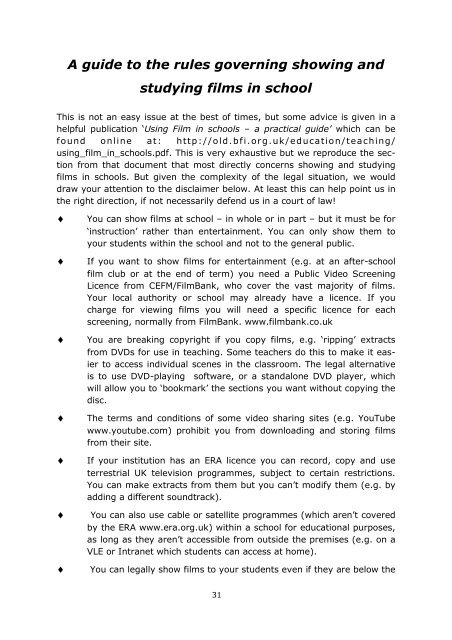Summer 2013 - The Independent Schools' Modern Language ...
Summer 2013 - The Independent Schools' Modern Language ...
Summer 2013 - The Independent Schools' Modern Language ...
Create successful ePaper yourself
Turn your PDF publications into a flip-book with our unique Google optimized e-Paper software.
A guide to the rules governing showing and<br />
studying films in school<br />
This is not an easy issue at the best of times, but some advice is given in a<br />
helpful publication ‘Using Film in schools – a practical guide’ which can be<br />
f ound online at: http://old.bfi.or g.uk/education/teaching/<br />
using_film_in_schools.pdf. This is very exhaustive but we reproduce the section<br />
from that document that most directly concerns showing and studying<br />
films in schools. But given the complexity of the legal situation, we would<br />
draw your attention to the disclaimer below. At least this can help point us in<br />
the right direction, if not necessarily defend us in a court of law!<br />
♦<br />
♦<br />
♦<br />
♦<br />
♦<br />
♦<br />
♦<br />
You can show films at school – in whole or in part – but it must be for<br />
‘instruction’ rather than entertainment. You can only show them to<br />
your students within the school and not to the general public.<br />
If you want to show films for entertainment (e.g. at an after-school<br />
film club or at the end of term) you need a Public Video Screening<br />
Licence from CEFM/FilmBank, who cover the vast majority of films.<br />
Your local authority or school may already have a licence. If you<br />
charge for viewing films you will need a specific licence for each<br />
screening, normally from FilmBank. www.filmbank.co.uk<br />
You are breaking copyright if you copy films, e.g. ‘ripping’ extracts<br />
from DVDs for use in teaching. Some teachers do this to make it easier<br />
to access individual scenes in the classroom. <strong>The</strong> legal alternative<br />
is to use DVD-playing software, or a standalone DVD player, which<br />
will allow you to ‘bookmark’ the sections you want without copying the<br />
disc.<br />
<strong>The</strong> terms and conditions of some video sharing sites (e.g. YouTube<br />
www.youtube.com) prohibit you from downloading and storing films<br />
from their site.<br />
If your institution has an ERA licence you can record, copy and use<br />
terrestrial UK television programmes, subject to certain restrictions.<br />
You can make extracts from them but you can’t modify them (e.g. by<br />
adding a different soundtrack).<br />
You can also use cable or satellite programmes (which aren’t covered<br />
by the ERA www.era.org.uk) within a school for educational purposes,<br />
as long as they aren’t accessible from outside the premises (e.g. on a<br />
VLE or Intranet which students can access at home).<br />
You can legally show films to your students even if they are below the<br />
31



